Five Years of Political Advertising on Facebook in Georgia
Key Findings
- In August 2020, Facebook (now Meta) launched the Ad Library in Georgia, providing data on political, electoral, and social advertisements. Between 2020–2025, a total of 172,577 ads targeting Georgian audiences were published across Meta’s platforms, with a combined value of up to $6.8 million USD. By average annual volume of ads, Georgia ranked 40th among 204 countries and territories, ahead of all countries with populations similar in size to Georgia’s. The most active advertisers were political parties, media outlets, and government institutions.
- Over the past five years, political parties spent at least $2.8 million USD on 33,875 ads. Among them, the number of disclosed political ads and the amount spent on them by Georgian Dream accounted for nearly half of all political party expenditures and disclosed ads on Meta platforms overall.
- Among media outlets, ad spending on Meta platforms was dominated by pro-government pages, with total spending reaching around $660,000 USD. Notably, POSTV and Imedi stood out, having published 24,347 ads worth $566,134 USD on Facebook and Instagram.
- Over the past five years, the pages of central government bodies, public institutions, autonomous republics, and municipalities placed at least 17,266 ads worth $852,619 USD. The most active were the Government Administration’s pages, which published 3,710 ads worth nearly $292,000 USD.
- Despite transparency requirements, networks of anonymous pages remained widely used for campaigns aimed at discrediting the opposition and promoting the ruling party, often accompanied by anti-Western messaging.
- Overall, Georgia’s political advertising space on Meta platforms was heavily dominated by the ruling party Georgian Dream, its affiliated media, and anonymous pages.
Introduction
In 2018, the social media giant Facebook (now Meta) created its Ad Library with the aim of ensuring transparency for users of its platforms (Facebook, Instagram, Messenger) and other interested stakeholders regarding advertisers placing ads related to elections, politics, and social issues. From 4 August 2020, Facebook’s Ad Library also became available in Georgia. This followed appeals from Georgian civil society organizations to the company ahead of parliamentary elections, amid an intensification of sponsored disinformation and smear campaigns on social media. From that date, advertisers seeking to publish sponsored posts on elections, social, or political issues in Georgia have been required to meet with mandatory authorization standards. At the same time, ads published in the library - along with information about advertisers, amounts spent, scope of distribution, and audience demographics - remain accessible to interested parties for seven years.
During the five years of the Ad Library’s operation in Georgia (from 4 August 2020 to 4 August 2025), a total of 172,577 ads worth $6,777,698 USD were published on Meta’s platforms for Georgian audiences. These ads were either self-declared by advertisers as related to elections, politics, or social issues, or identified as such by the platform itself. Notably, out of 204 countries and territories, Georgia ranked 40th globally in terms of both the total and the annual average number of political and social ads.
Pages most actively placing ads
35% of all ads related to elections, politics, and social issues were placed by 20 Facebook pages. The most active advertisers were media outlets - Tabula, Imedi, and POSTV. Among political organizations, the official page of Georgian Dream stood out for the frequency of its ad placements.
According to Meta’s Ad Library, 54% of the total spending on social and political advertising on Facebook and Instagram during the five-year period came from these 20 pages, most of which belong to political parties or politicians. The largest sum - $627,306 USD - was spent on ads from the official Facebook page of Georgian Dream. This figure was almost twice as high as the amount spent by the page with the second-largest advertising budget.
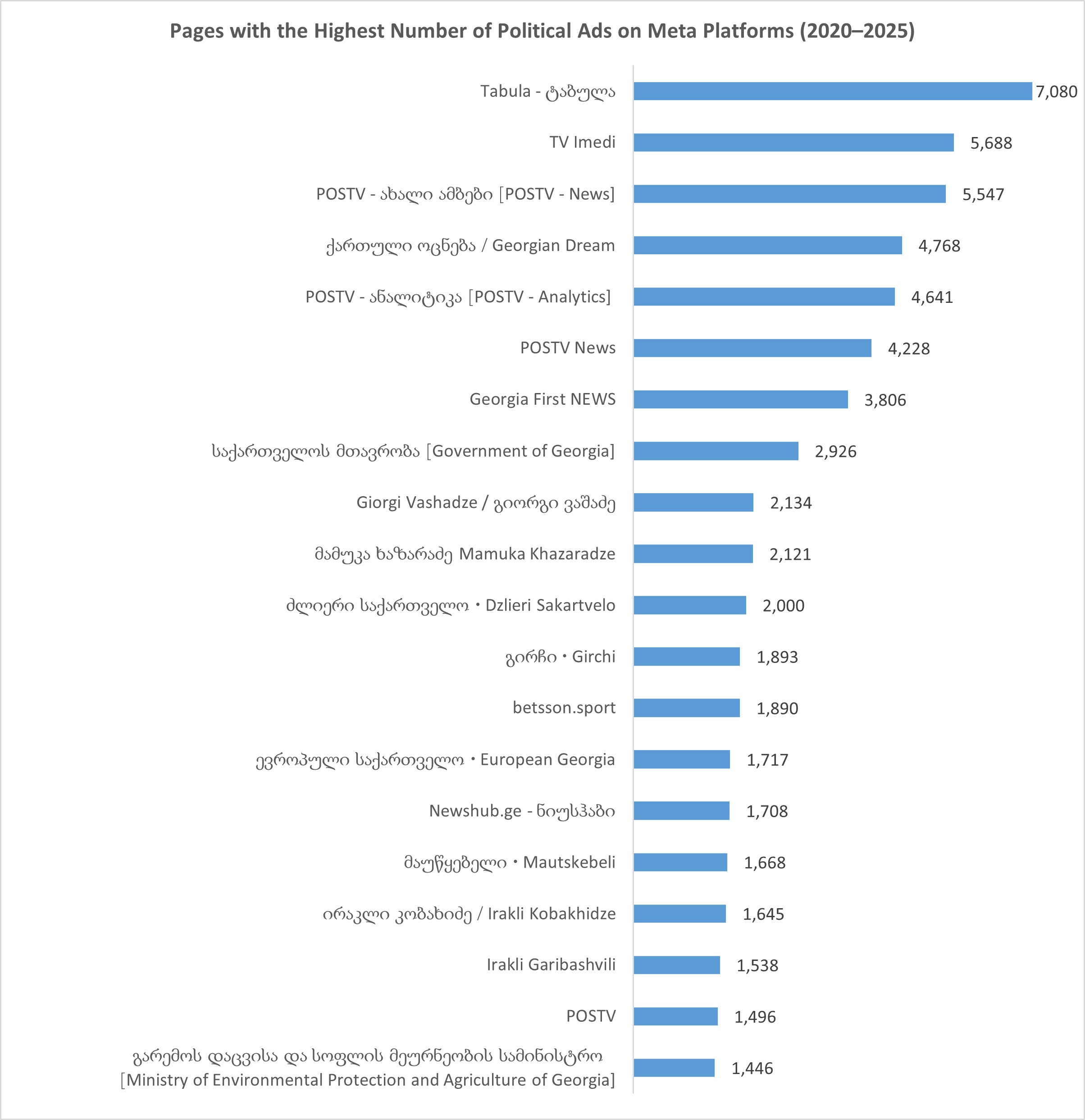
Among the main official pages of opposition political groups, the highest advertising spending in the last five years came from Lelo for Georgia (Strong Georgia), European Georgia, Ahali (Coalition for Change), United National Movement, and Girchi. Among individual politicians, the largest sums on Facebook and Instagram ads were spent on the pages of Nika Melia, Irakli Kobakhidze, Irakli Garibashvili, Mamuka Khazaradze, Giorgi Vashadze, Shalva Papuashvili, Giorgi Gakharia, and Badri Japaridze.
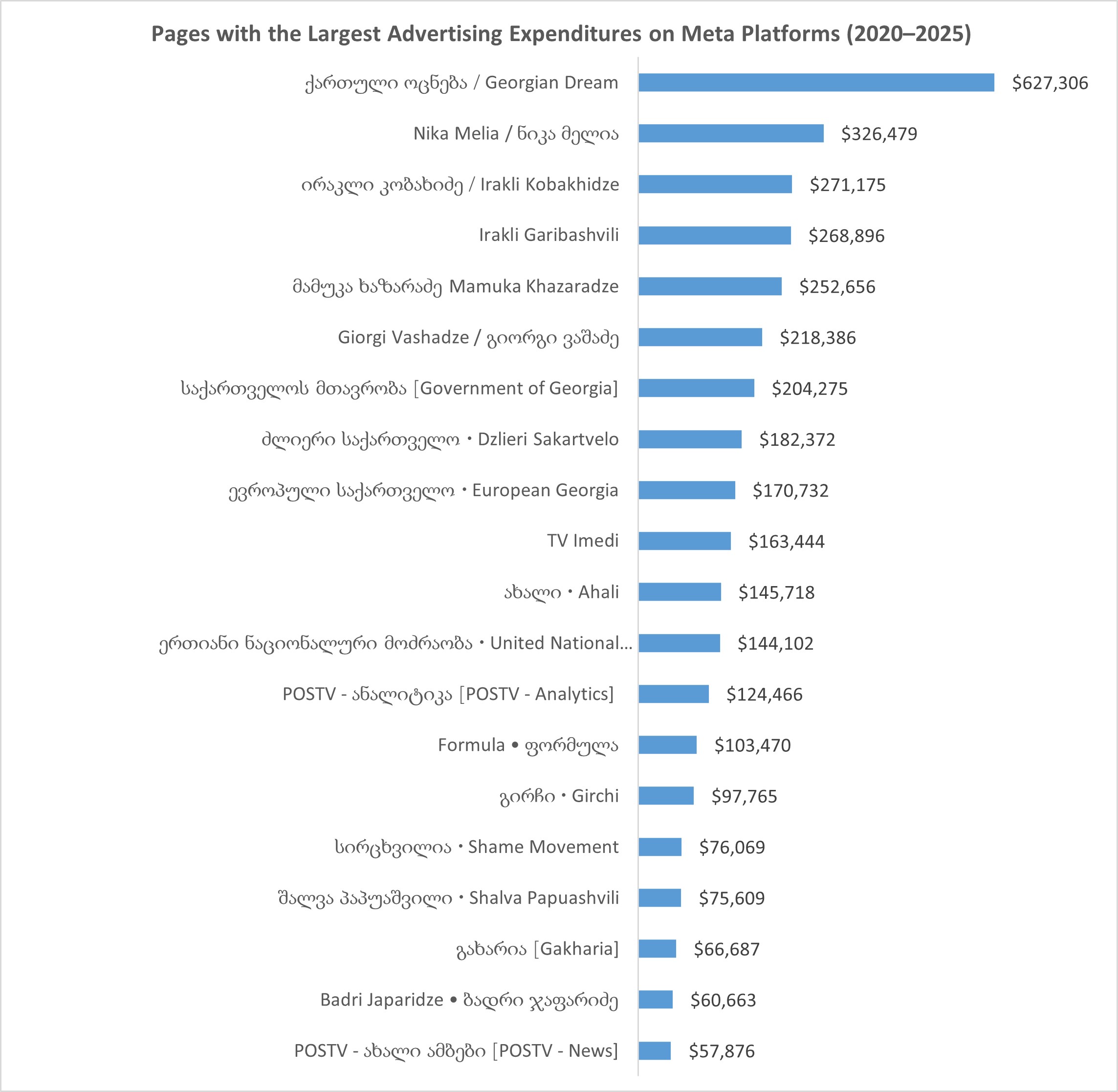
Disclosed ads by political parties
For the most part, advertising expenses on the official pages of political parties and politicians were disclosed in accordance with Meta’s rules. Based on disclaimers indicated on Facebook and Instagram ads, the main payers were political associations, both for party and personal politician pages. In some cases, however, individual politicians themselves were listed as payers.
Over the past five years, the Ad Library has recorded 33,875 political ads with disclaimers containing the name and/or ballot number of a political party or campaign. Their total value amounted to at least $2.8 million USD. Among them, the number of disclosed political ads and the amount spent on them by Georgian Dream accounted for nearly half of all political party expenditures and disclosed ads on Meta platforms overall.
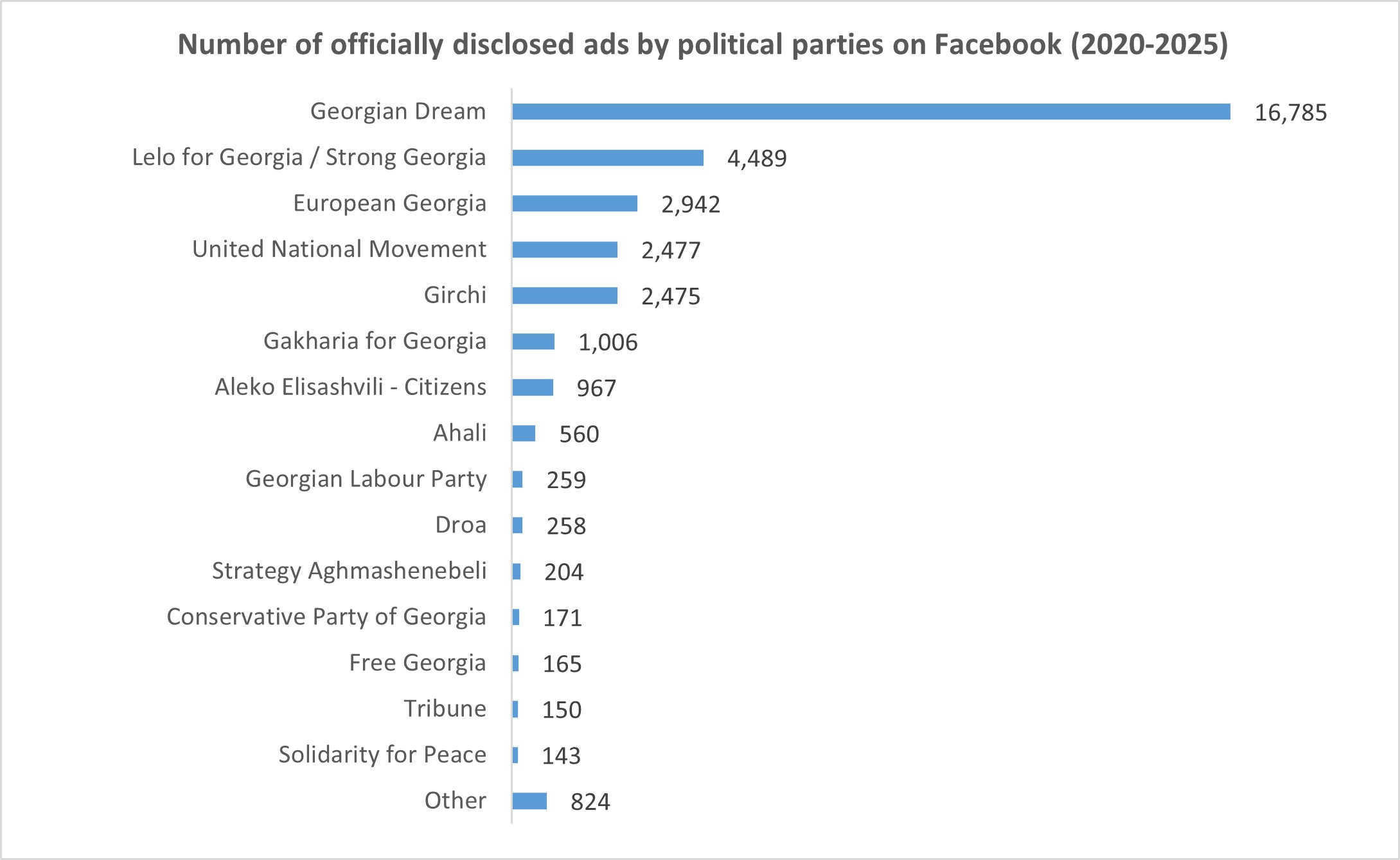
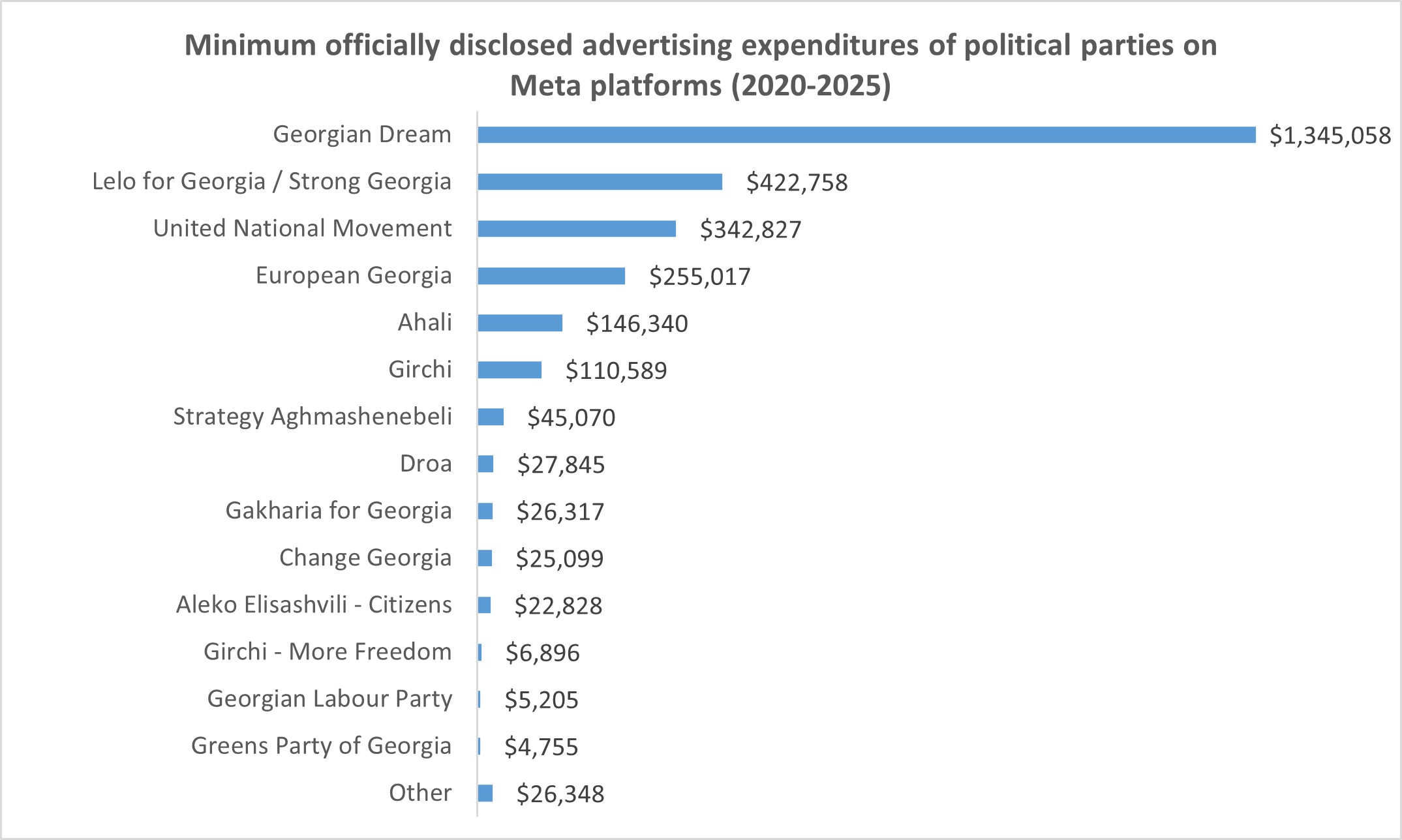
Note: The figures represent the minimum amount spent on advertisements in which the advertiser’s information included the name and/or number of a political party or an election campaign.
Ads by public institutions on Meta’s platforms
Between 4 August 2020 and 4 August 2025, pages belonging to the central government, public agencies, autonomous republics, and municipalities published at least 17,266 ads worth $852,619 USD on Meta’s platforms. The most active were the government administration’s pages, with 3,710 ads totaling nearly $292,000 USD. Notable advertising activity was also observed from official pages of various ministries, the election administration, and Tbilisi City Hall.
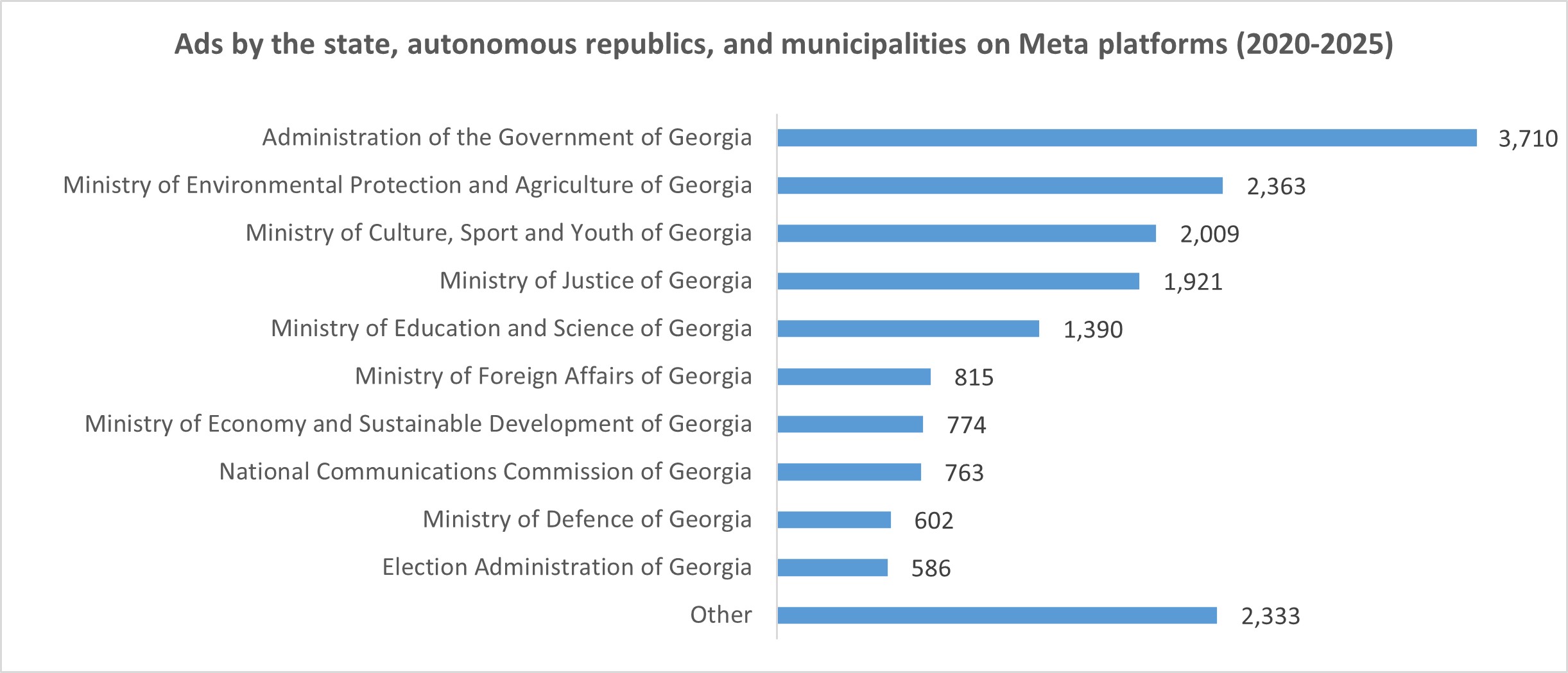
Note: Advertisements by ministries also include ads from the pages of agencies subordinated to the respective ministry.
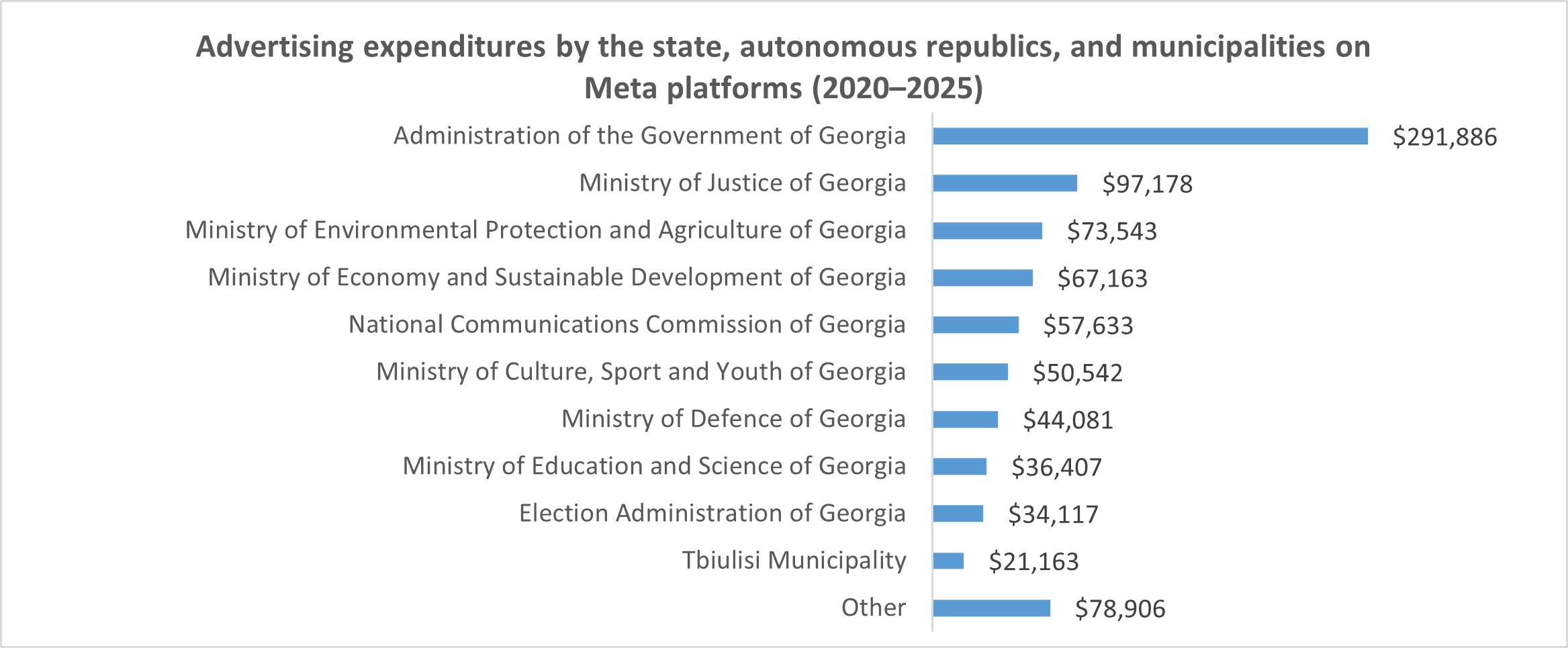
Note: Advertisements by ministries also include ads from the pages of agencies subordinated to the respective ministry.
Media outlets’ political and social ads
Among media outlets, pro-government media pages were responsible for the bulk of political and social advertising spending, totaling up to $660,000 USD. POSTV and Imedi alone published 24,347 ads worth $566,134 USD on Facebook and Instagram. It should be noted that POSTV ran ads across multiple affiliated pages, including: POSTV, POSTV - ანალიტიკა [POSTV - Analytics], POSTV - ახალი ამბები [POSTV - News], POSTV - პოლიტიკა [POSTV - Politics], POSTV - რეალობა [POSTV - Reality], POSTV News, დამუხტე [Charge It], ევროკრატია - ყოფილი ევროპა [Eurocracy - Former Europe], ევროპის დაისი [Europe’s Dawn], ლიბერალიზმის ანატომია [Anatomy of Liberalism], მედია რენტგენი [Media X-Ray], ევროკრატია [Eurocracy], and კონსერვატორია [Conservatory]. In recent years, most ads by Imedi and POSTV contained explicit campaigning in favor of Georgian Dream and against opposition political groups. This advertising campaign effectively blurred the line between the ruling party and these media outlets. A significant portion of the ads also carried anti-Western messaging.
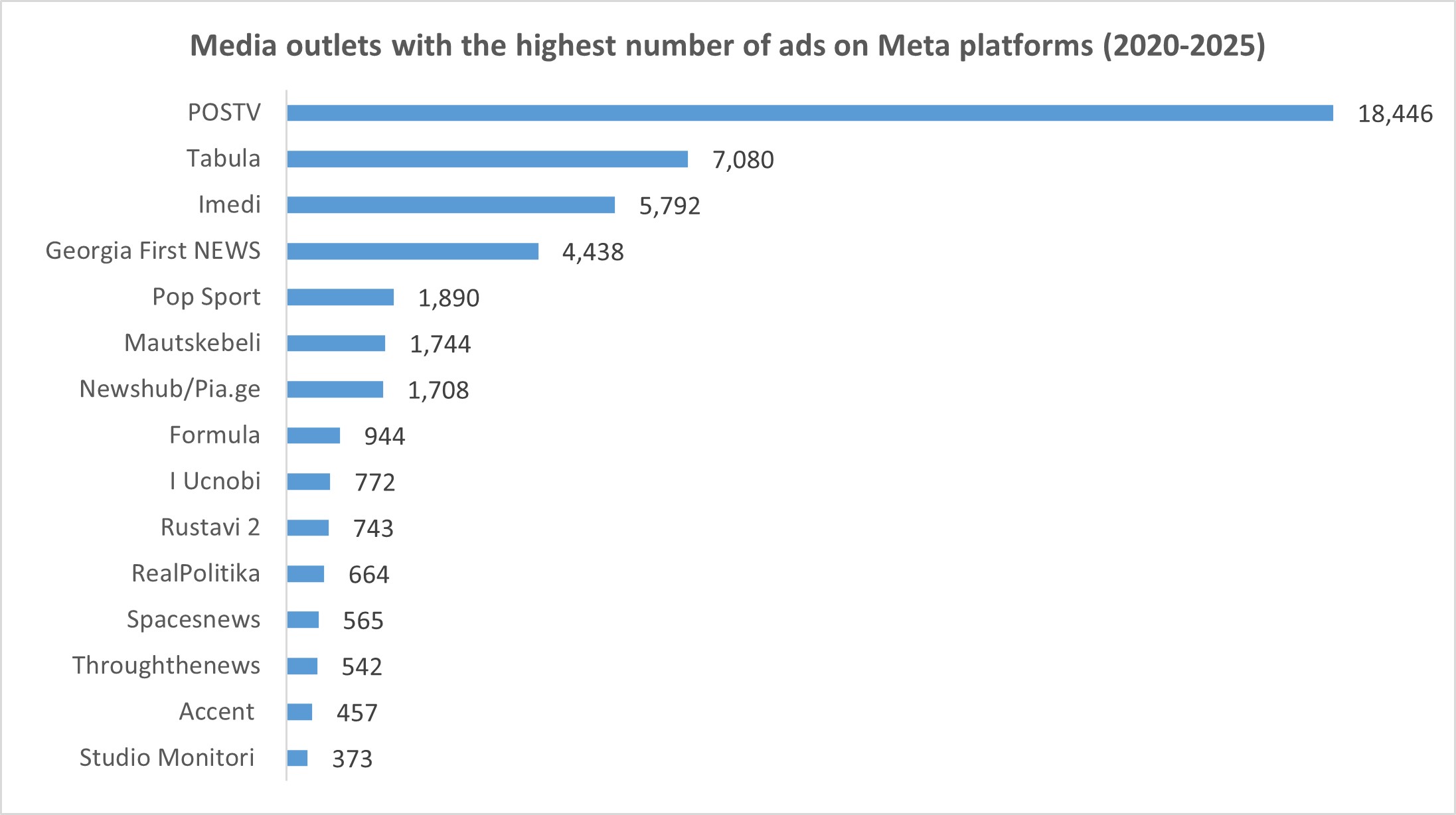
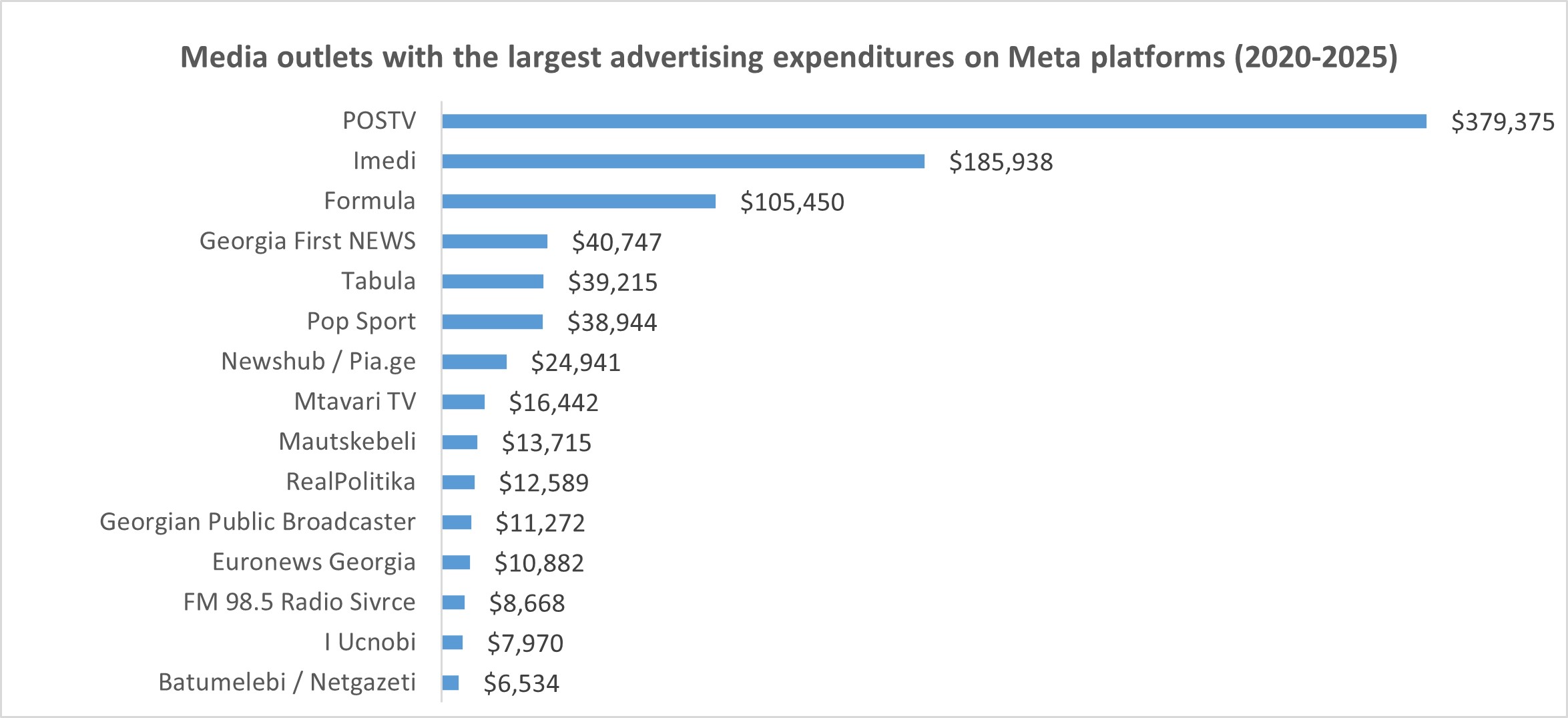
Unofficial/anonymous advertising campaigns
Despite the launch of the Ad Library in August 2020, anonymous pages managed to bypass the rules. The information provided on their ads generally did not allow for the identification of advertisers. However, ISFED’s monitoring and investigation revealed the identities of some of the actors behind coordinated anonymous pages, findings partly confirmed by Facebook/Meta itself. For example, the anonymous pages Archive • არქივი and პოლიტიკური მოთვალთვალე [Political Watcher] - which discredited opposition, civil activists, and independent media - were traced back to Davasrulot, an organization founded in 2020 by Ia Metreveli and others. In 2023, anonymous pages like არ აგარევინებთ [We Won't Let You Mess It Up] and აგენტურა [Intelligence] were linked to networks associated with Vato Shakarishvili.
Over the past five years, at least 164 anonymous pages published 11,378 ads supporting or discrediting political parties, worth a total of at least $223,860 USD. 93% of these ads were directed against the opposition and in favor of Georgian Dream. Spending on such ads accounted for about 90% of all anonymous ad spending.
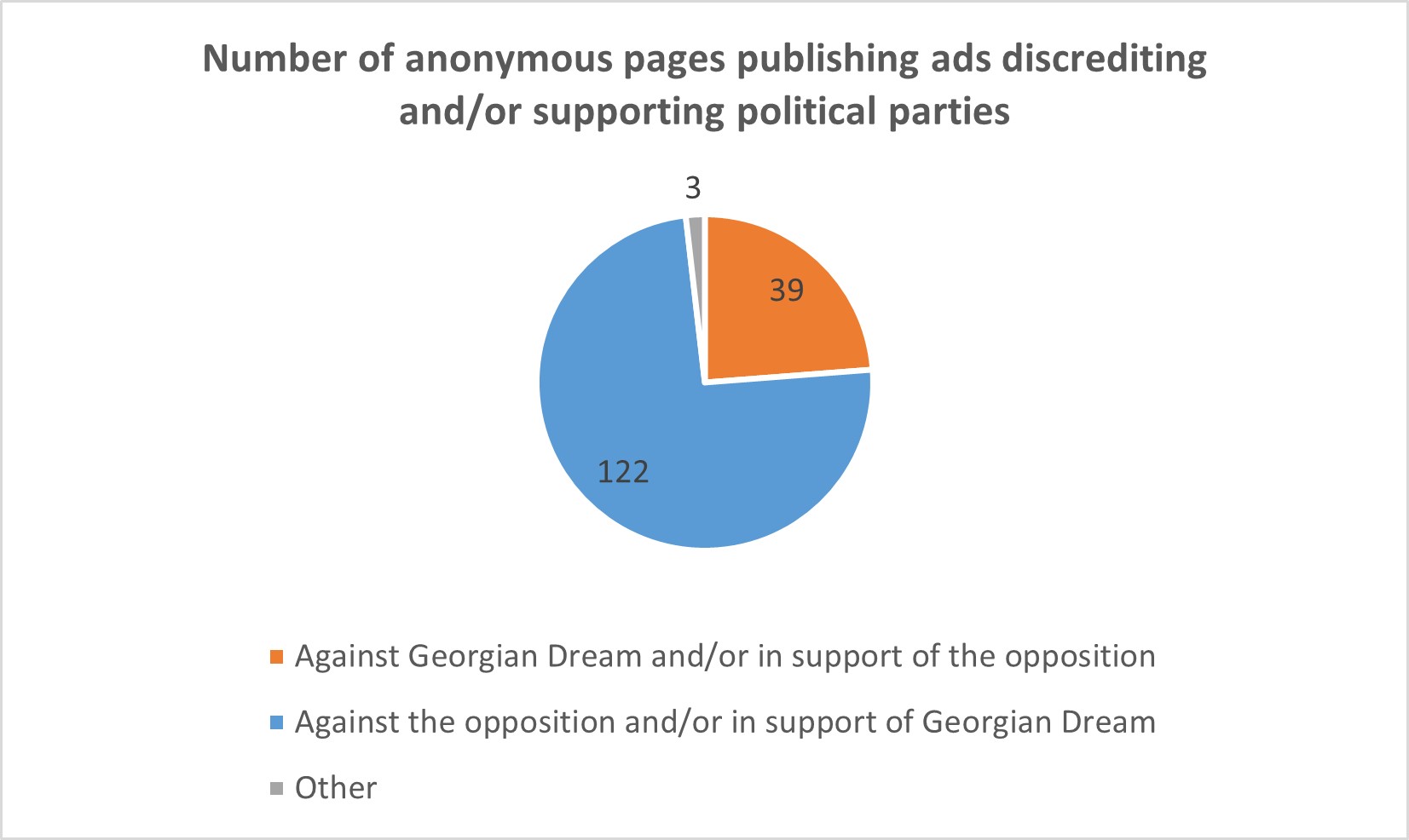
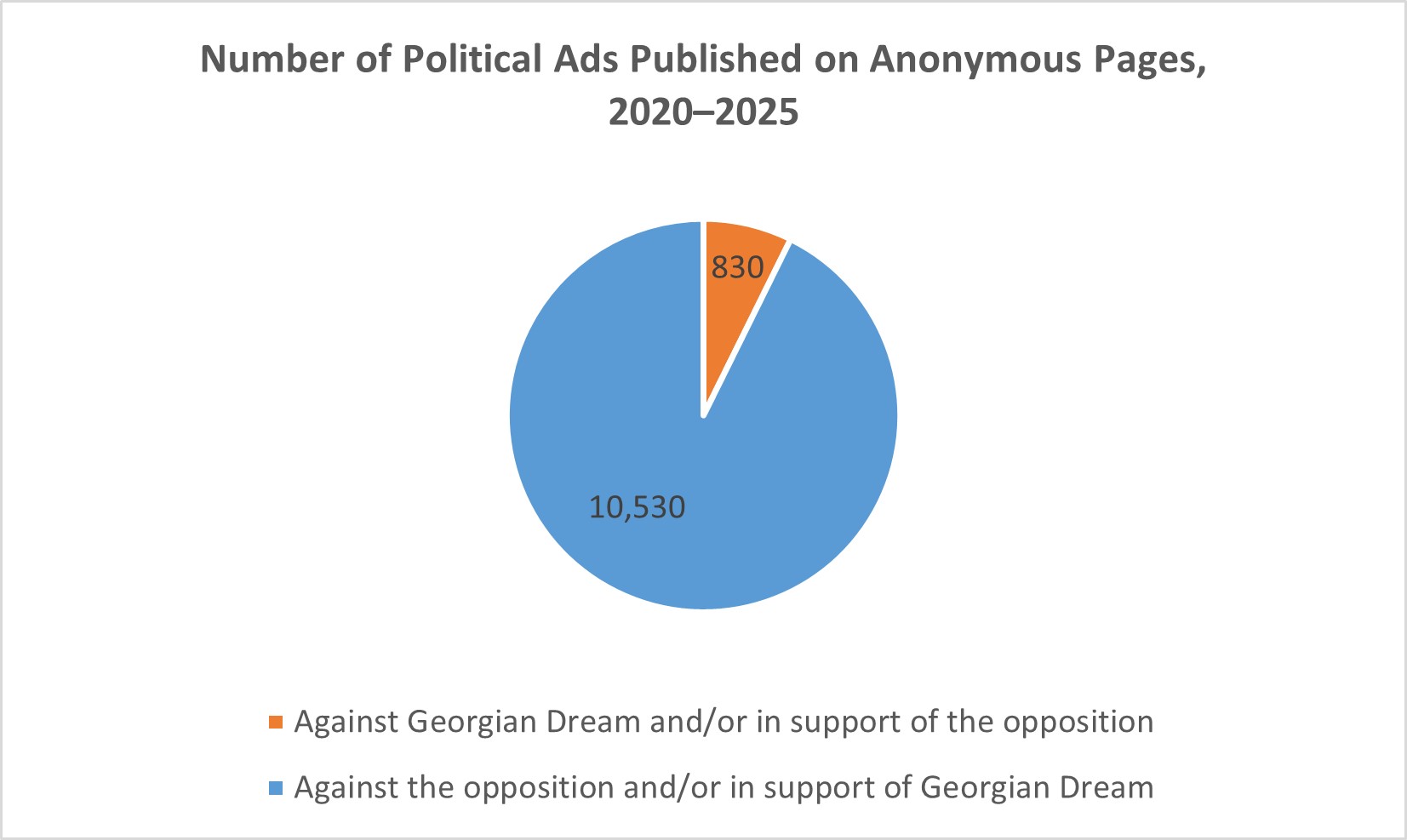
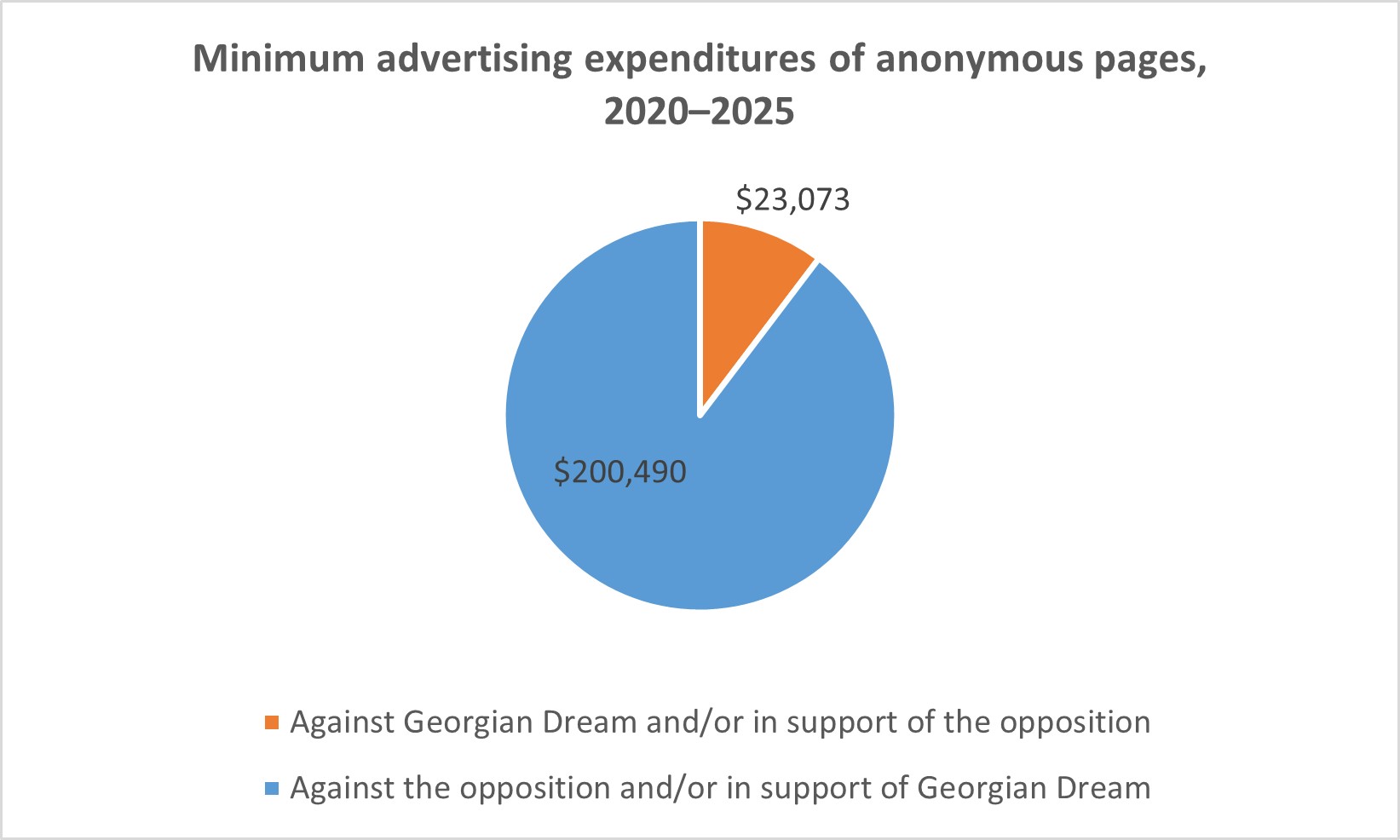
Some anonymous supportive and discrediting pages used the same personal names, though their authenticity cannot be confirmed. For example, ads published under the name Giorgi Beridze appeared on several pro-Georgian Dream and anti-opposition pages, including: დავით გარეჯი საქართველოა [David Gareji is Georgia], მამული, ენა, სარწმუნოება [Homeland, Language, Faith], მე ქრისტიანი ვარ [I Am Christian], უფლის რწმენა გადაგვარჩენს [Faith in God Will Save Us], and და ქართული გენი უკვდავია [Georgian Gene Is Immortal]. Interestingly, the same name appeared as the advertiser on the page ჩვენ გვიყვარს მიშა [We Love Misha], which falsely presented itself as a pro-Mikheil Saakashvili page. Other names used include Giorgi Kvaratskhelia, who was listed as the advertiser on seven pro-Georgian Dream pages, and Manana Kaxidze, linked to ads on four additional pro-Georgian Dream pages. Natela Kiladze appeared as advertiser on five anti-opposition pages, while Ramaz Beridze was listed on both პოლიტიკური აბსურდი [Political Absurd] and ქართული ჟურნალისტიკის მარგალიტები / journalist fails. Pages with strong pro-government and anti-opposition narratives stood out in terms of advertising spending. Many of these pages were repeatedly removed by Meta for rule violations but quickly reappeared under identical or similar names. Notably, the page system არ აგარევინებთ [We Won't Let You Mess It Up], linked to Vato Shakarishvili and his movement, was deleted four times but restored each time.
Pages and page systems that spent more than $10,000 USD on ads included: Bidzina Ivanishvili for Georgia, (არ აგარევინებთ • ar agarevinebt [We Won't Let You Mess It Up], ქართული ოცნება ჩემი არჩევანია [Georgian Dream Is My Choice], რა კეთდება (ქართული ოცნების მხარდამჭერები) [What’s Being Done/Georgian Dream Supporters], Irakli Garibashvili 4 Georgia, შიგ ევროპაში [Straight into Europe], and others. In recent years, many of these pages not only campaigned for Georgian Dream and against the opposition, but also actively promoted anti-Western and anti-EU narratives.
Anonymous pages leading by advertising expenditure
Geographic distribution of advertising
Over the past five years, more than 52.5% of all advertising spending on Meta’s platforms targeted audiences in Tbilisi. The regions of Imereti and Adjara followed, together accounting for around 20% of total ad spending.
Overview of ads about social issues, elections or politics
As part of its social media monitoring, ISFED describes the characteristics of ads placed on Meta’s platforms -Facebook, Instagram, and Messenger - that are targeted at Georgian audiences and relate to elections, politics, or social issues. The report is based on data from Meta’s Ad Library and observations by social media monitors. Page categorization is based on open sources and ISFED’s updated internal database.
Meta defines ads about social issues, elections, and politics as those that:
- Are made by (or on behalf of), or about a candidate running for public office, a political figure, a political party or advocates for the outcome of an election to public office;
- Are about any election, referendum, or ballot initiative, including "go out and vote" or election campaigns;
- Are about social issues in the location where the ad is placed. Learn more about what we consider to be ads about social issues;
- Are regulated as political advertising.
Under Meta’s rules, advertisers placing such ads must disclose that they concern these topics. The platform also reserves the right to remove ads that violate this rule.
The Ad Library includes information on all ads placed on Meta’s platforms that were either self-disclosed as political/social ads by advertisers or identified as such by Meta. After an ad’s run ends, it remains in the library archive for seven years. Ads not disclosed or identified as political/social disappear after expiry, along with information about their advertisers and spending.


